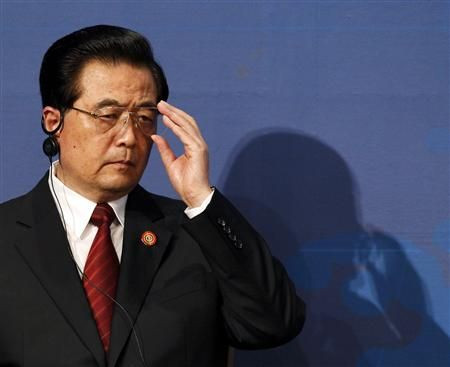U.S. tries fence-mending with China

President Hu Jintao of China is coming to America next week, to meet with President Barack Obama and discuss relations between the world's two largest economies.
The administration is hopeful that the state visit will improve relations between the nations, relations which have often of late been strained. Just how the nations are to become better global partners, given their many policy differences, is the dominating question.
U.S. Treasury Secretary Timothy Geithner, speaking today at Johns Hopkins University's School of Advanced International Studies, outlined what, in the administration's view, the nations are looking for from each other.
In our economic relationship with China we have focused on two principal objectives, Geithner said.
The first is to expand opportunities for U.S. companies to export and sell to the Chinese market. This requires a more level playing field for U.S. companies that compete with Chinese companies in China, in the United States, and around the world.
Our second objective is to promote reforms that will reduce China's reliance on export led growth and encourages a shift to domestic consumption and investment. As part of this, China's exchange rate needs to strengthen in response to market forces.
Geithner said that the changes in Chinese policy that the U.S. seeks from its exchange rate to its treatment of intellectual property - reflect changes that are fundamentally in China's interest.
China will need to make these changes in order to promote its own long-term prosperity, he said.
What China wants, according to administration, is more access to U.S. high technology products, the ability to take greater advantage of investment opportunities in the U.S. and to be accorded the same terms of access that market economies enjoy, Geithner said.
The Treasury Secretary said the U.S. is willing to help China achieve these goals.
But our ability to move on these issues will depend of course on how much progress we see from China, he said.
As China reduces the role of the state in the economy, reforms policies that discriminate against U.S. companies, removes subsidies and preferences for domestic firms and technology, and allows its exchange rate to reflect market forces, then we will be able to make more progress on China's objectives, Geithner said.
Geithner added that, although the countries compete globally, our economic strengths are largely complementary.
David Shambaugh, senior fellow at Brookings Institute, said in a recent article that, since President Obama's visit to China in November 2009, Sino-American relations have been extremely strained -- the worst in at least a decade.
President Hu's pending visit offers an important opportunity to stabilize the hemorrhaging relationship. Observers all over the world wonder if this will occur and, if so, how long will the new stability last? Shambaugh said.
Noting that Obama's trip to China was greatly controlled by the Chinese for publicity reasons, Shambaugh said that, nonetheless, the 2009 Joint Statement issued by the two nations provided a visionary roadmap for building the relationship on bilateral, regional, and global levels-and particularly provided evidence of the international partnership that the Obama administration sought from Beijing.
The Joint Statement also listed a series of new bilateral agreements in science and technology, clean energy, civil aviation, agriculture, public health, space science, and cultural and educational exchanges, Shambaugh said.
But the progress the Joint Statement envisioned has not taken place, he said.
No sooner had the ink dried on the document than the relationship foundered on a rapid succession of troublesome issues, Shambaugh said, and listed the points of contention:
Divergent positions at the UN Climate Change Conference in Copenhagen in December 2009; Obama's meeting with the Dalai Lama; the administration's decision to authorize $6.4 billion in defensive arms and equipment transfers to Taiwan; the Google controversy and subsequent concerns about internet controls in, and cyber hacking by, China; continuing concerns that China was manipulating its currency; China's watering down of U.N. sanctions against both North Korea and Iran; Beijing's cancellation of official talks on non-proliferation and arms control; the continually ballooning trade deficit with China; continuing Chinese violations of intellectual property; complaints by American and other foreign companies about an increasingly restrictive operating environment in China; American concerns about subsidies behind China's indigenous innovation and state procurement policies; deepening concerns over the deterioration of human rights conditions in China; Chinese concerns over U.S. intelligence collection and surveillance in China's 200 mile Exclusive Economic Zone; U.S. naval and air military exercises with South Korean forces in the Yellow Sea; China's refusal to recognize the findings of a multinational investigation into the sinking of the South Korean warship Cheonan or to publicly condemn North Korea for the sinking; China's refusal to publicly condemn Pyongyang's late-November artillery shelling of the South Korean island Yeonpyeong;;China's minimal contributions to the international effort in Afghanistan; China's newly assertive claims to disputed waters in the East China Sea and South China Sea.
Shambaugh said that, for the coming meeting to succeed, the nations will have to move beyond glad-handing and photo ops and return to the positive ideas express in the 2009 Joint Statement.
The nations need to agree to put in place a series of inter-governmental mechanisms to implement the 2009 Joint Statement and forge tangible cooperation 365 days per year. A one-day summit does not accomplish this, nor does the two-day annual convening of the Strategic & Economic Dialogue, he said.
He termed the Defense Consultation Talks and the U.S.-China Joint Commission on Commerce & Trade exceptions to the current, strained interaction between the nations and suggested these arrangements as models for improvement in other areas.
Shambaugh called for the establishment of bilateral institutionalized Working Groups in a wide range of issue areas. China's relationships with Russia and the European Union are deeply institutionalized as such, but the U.S.-China relationship has never been.
© Copyright IBTimes 2024. All rights reserved.





















